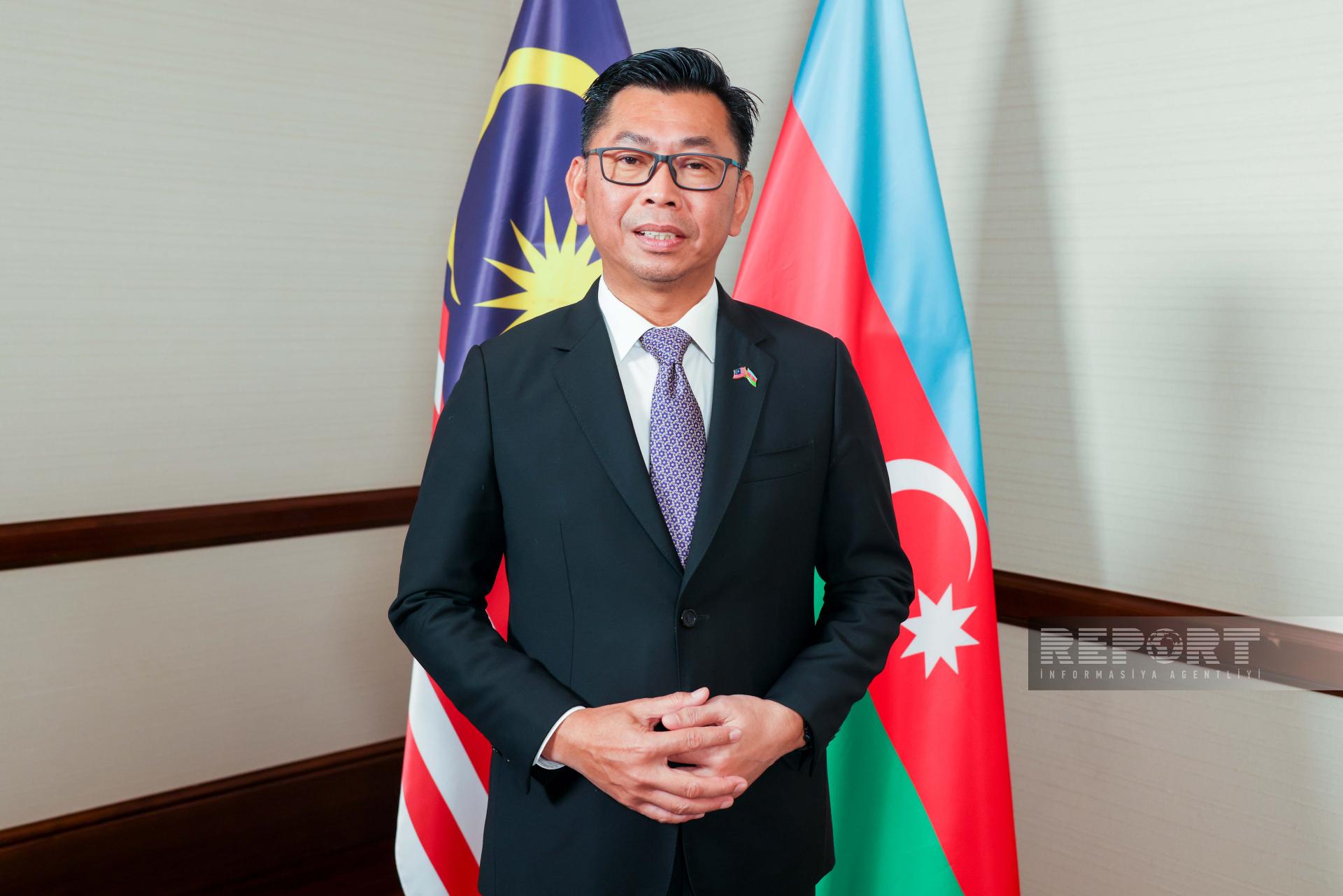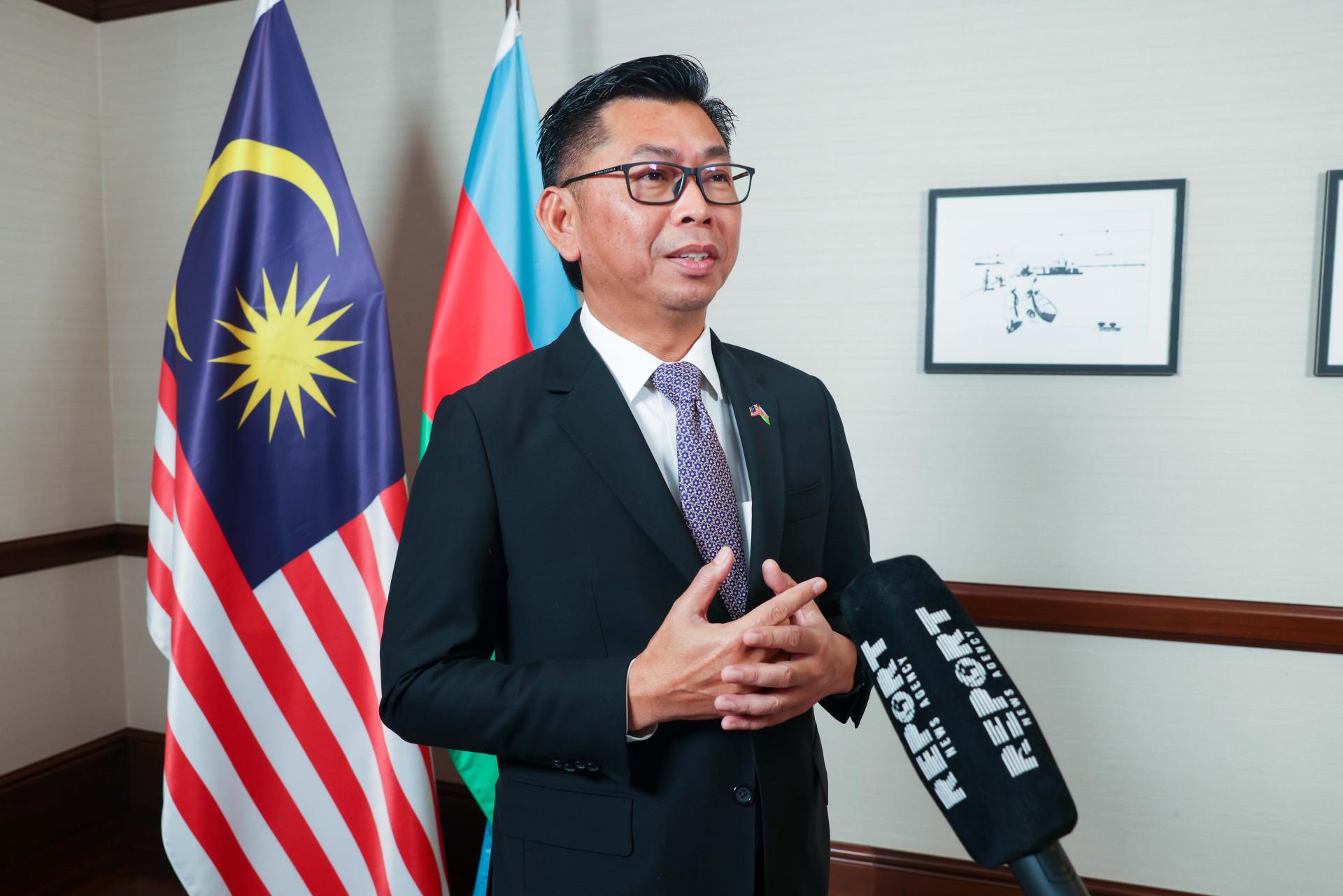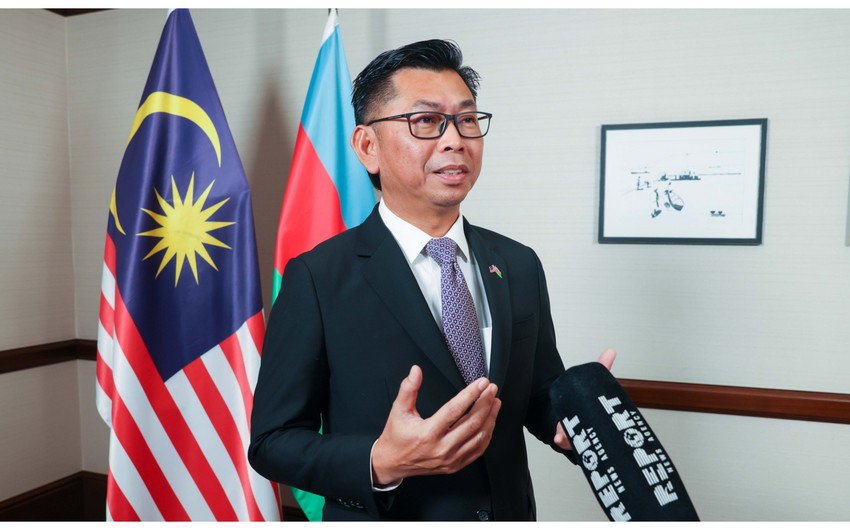Azerbaijan is steadily strengthening its position on the international stage year by year, becoming an increasingly attractive partner for cooperation. Both developed and developing countries are showing interest in establishing and expanding ties with a state that confidently asserts itself as a key player in the South Caucasus region. Many seek not only to foster close cooperation with Baku but also to learn from the successful experience of the country known as the "Land of Fire."
One such country is Malaysia. The visit to Baku by Malaysia's Deputy Foreign Minister Datuk Mohamad Alamin is yet another confirmation of Kuala Lumpur’s interest in expanding bilateral cooperation.
In an interview with Report, the high-ranking Malaysian diplomat spoke about the key areas of cooperation between the two countries, the goals of his visit, and emphasized the importance of further deepening relations both at the diplomatic and economic levels.
- How do you assess the current state of Malaysia-Azerbaijan relations?
- Malaysia and Azerbaijan enjoy longstanding and friendly ties since the establishment of diplomatic relations in 1993. Our partnership is grounded in shared values—mutual respect, non-interference, and a strong commitment to multilateralism. Over the years, we have maintained cordial political relations and close cooperation in international platforms.
Looking ahead, there is significant room to deepen our collaboration in several key areas. Economic cooperation, particularly in trade, investment, and the halal industry, holds strong promise. We also see great potential in enhancing education and scientific exchange, especially through joint research, technical training, and academic mobility.
People-to-people ties are another area we value greatly. There are opportunities to boost cultural diplomacy and Islamic tourism, which can bring our communities closer together and foster deeper mutual understanding.
As we chart the way forward, both countries should continue strengthening institutional frameworks—such as through agreements and working committees—to provide a more structured and strategic basis for cooperation. I am confident that with sustained dialogue and goodwill, Malaysia-Azerbaijan relations will continue to grow from strength to strength.
- One of the key purposes of your visit is to hold political consultations. Could you please detail on their content and key topics for discussions?
- The primary objective of our political consultations is to further strengthen the longstanding and friendly relationship between Malaysia and Azerbaijan. Over the years, both countries have worked closely in a variety of areas, including diplomacy, trade, education, and cultural exchange, and we seek to build on this solid foundation.
During my meeting with Deputy Foreign Minister Elnur Mammadov, we identified new avenues for collaboration and deepen existing partnerships. We particularly discussed ways to expand economic cooperation, including trade and investment, and exploring opportunities in key sectors such as energy, agriculture, and technology.

We also addressed regional and global challenges together, reaffirming our commitment to multilateralism and the importance of international cooperation. Additionally, we looked into enhancing cultural ties, fostering greater people-to-people exchanges, and strengthening our cooperation within international platforms.
The expected outcomes from these consultations will be a set of concrete steps and agreements that will help institutionalize our cooperation, making our bilateral relations even more robust and forward-looking.
Ultimately, the goal is to continue building a mutually beneficial partnership that will contribute to peace, stability, and prosperity in both our countries and the wider region.
- In your opinion, in which areas can economic cooperation between our countries be further expanded?
In 2024, the trade between Malaysia and Azerbaijan showed significant figures with Malaysia's exports to Azerbaijan valued at USD24.93 million and imports at USD0.97 million. Therefore, Malaysia believes that there is potential for greater economic collaboration between both countries and remain committed to supporting efforts that strengthen bilateral economic ties between Malaysia and Azerbaijan.
Potential areas of collaboration between Malaysia and Azerbaijan are as follows:
Oil & Gas: Azerbaijan is a significant player in the global oil and gas industry, with substantial reserves and a well-developed energy sector. Malaysian companies, with their expertise in oil and gas exploration, production, and technology, are well-positioned to engage in Azerbaijan’s energy sector. Malaysian oil and gas companies can explore joint ventures or partnerships with Azerbaijani firms to participate in the exploration and production of oil and gas resources.
Renewable Energy: Malaysia is focusing on sustainable energy sources such as solar and biofuels. As Azerbaijan seeks to diversify its energy sector via wind and solar projects, engagement between the two nations, particularly in research, technology transfer, and investments in renewable energy projects, might be mutually advantageous.
Wood products: Malaysia, as a major supplier of wood products and furniture to the world, is well-positioned to fulfil this demand. Azerbaijan can benefit from Malaysian exporter’s expertise in the sector including the supply of various wood-based products, materials, and furniture types.
Tourism: Malaysia and Azerbaijan are rich in culture, history, and natural beauty that make both countries an emerging tourism hotspot. There are great potentials for collaboration in improving the tourism industry in both countries. But for this to take place we need to improve the flight connectivity; digital tourism; joint tourism marketing as well as promotion; and sharing of expertise in hospitality management.
Education: There are opportunities for Malaysia and Azerbaijan to strengthen partnerships in education sector including through student exchanges, research partnerships, vocational training, and cultural programmes. Malaysia is one the well-known education hub in Southeast Asia and we encourage the people from across the nation to further their studies in Malaysia.
With the strong and continued support of Azerbaijan’s government including through the investor-friendly regulations and progressive economic policies, Malaysia believes that Azerbaijan will emerge as an attractive destination for Malaysian companies looking to expand beyond the ASEAN region.
Additionally, Malaysia strongly encourages Malaysian and Azerbaijani businesses to actively explore mutually beneficial opportunities, leveraging each other's strengths to build sustainable, long-term partnerships.
- Are there any upcoming return visits of Azerbaijani officials to Malaysia or other planned high-level bilateral engagements in the near future?
- Malaysia warmly welcomes the opportunity for high-level visits between our two countries. I brought with me an invitation from my Foreign Minister to his His Excellency Jeyhun Bayramov, Foreign Minister of Azerbaijan to visit Kuala Lumpur.
We look forward to hosting the Foreign Minister of Azerbaijan in Malaysia, as such visits are vital for translating our shared political goodwill into tangible, cooperative actions. The visit will further strengthen our bilateral ties and deepen the collaboration between Malaysia and Azerbaijan.
- Azerbaijan recently joined the Organization for Economic Cooperation (D-8). How do Baku and Kuala Lumpur plan to collaborate within this multilateral platform?
- I would like to start by expressing Malaysia’s warm welcome to Azerbaijan as the newest member of the D-8 Organisation for Economic Cooperation. This historic inclusion marks Azerbaijan as the first new member since the organisation was established in 1997. It demonstrates the growing appeal and significance of the D-8 as a platform for multilateral collaboration.
Malaysia believes Azerbaijan’s membership will significantly enrich the organisation by providing valuable perspectives in its focus areas, such as trade, energy, transportation, tourism, SMEs, and food security.

With the Preferential Trade Agreement (PTA), Customs, and Visa Agreements offered by the D-8 to its members, along with Azerbaijan’s exceptional leadership during its presidency of COP29 in 2024, the opportunity for multilateral cooperation between Malaysia and Azerbaijan holds immense promise.
Malaysia looks forward to expanding the potential cooperation in trade and investment between the two countries, particularly in vital sectors such as energy, the urgent challenges of climate change, and the pursuit of sustainable development that would create mutual benefits and drive progress in these critical areas.


 https://images.report.az/photo/279a97bc-a4c5-3932-bec2-2b42995ceefe.jpg
https://images.report.az/photo/279a97bc-a4c5-3932-bec2-2b42995ceefe.jpg

